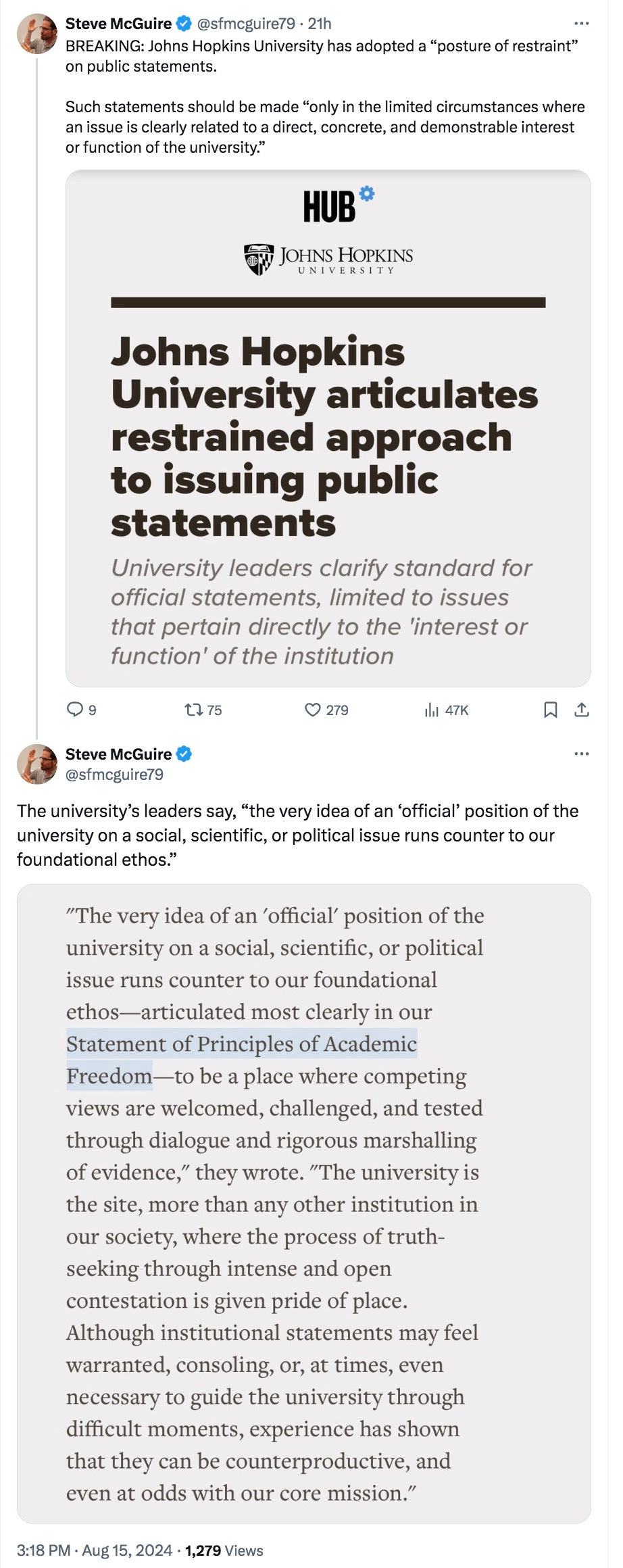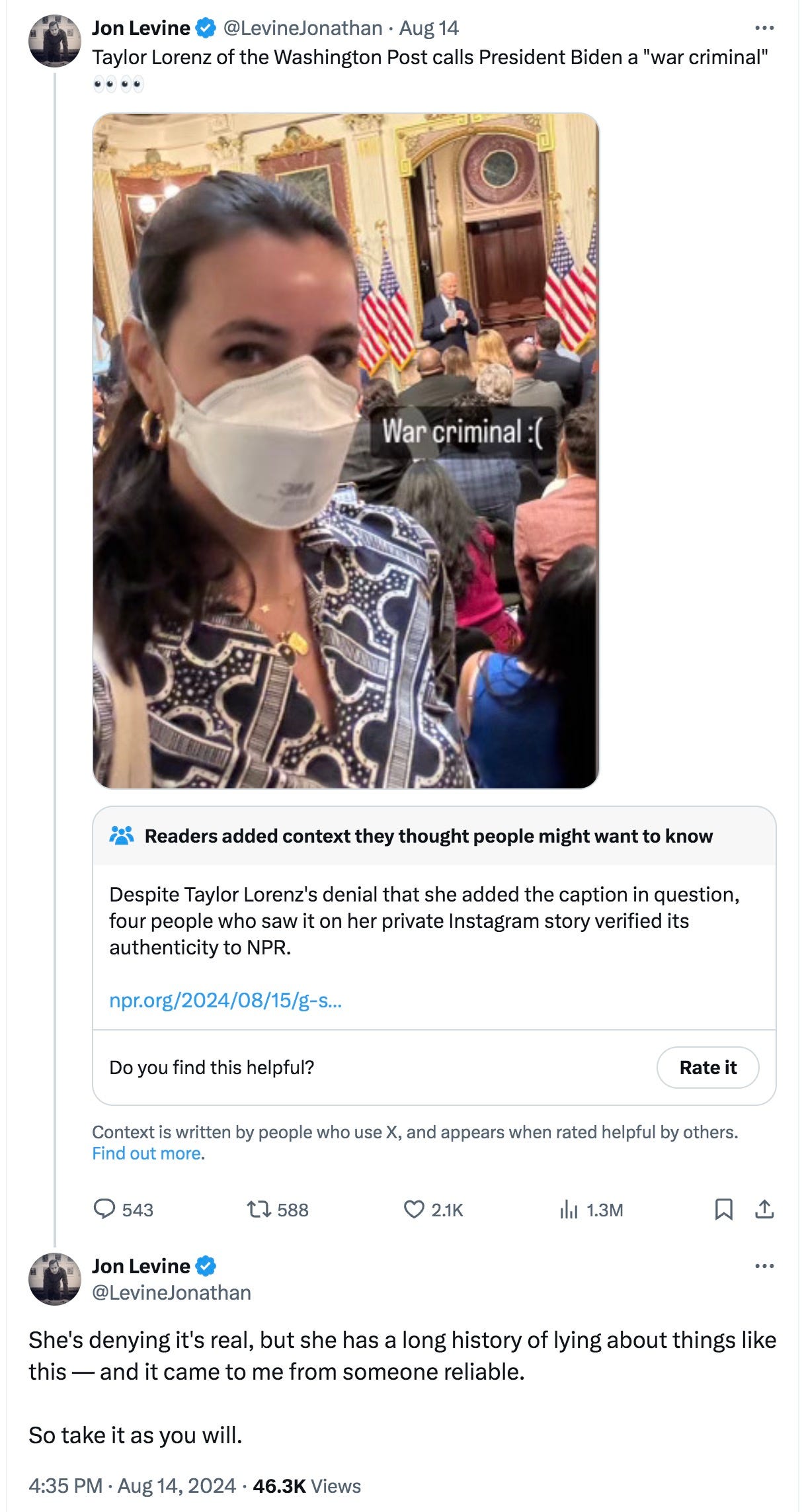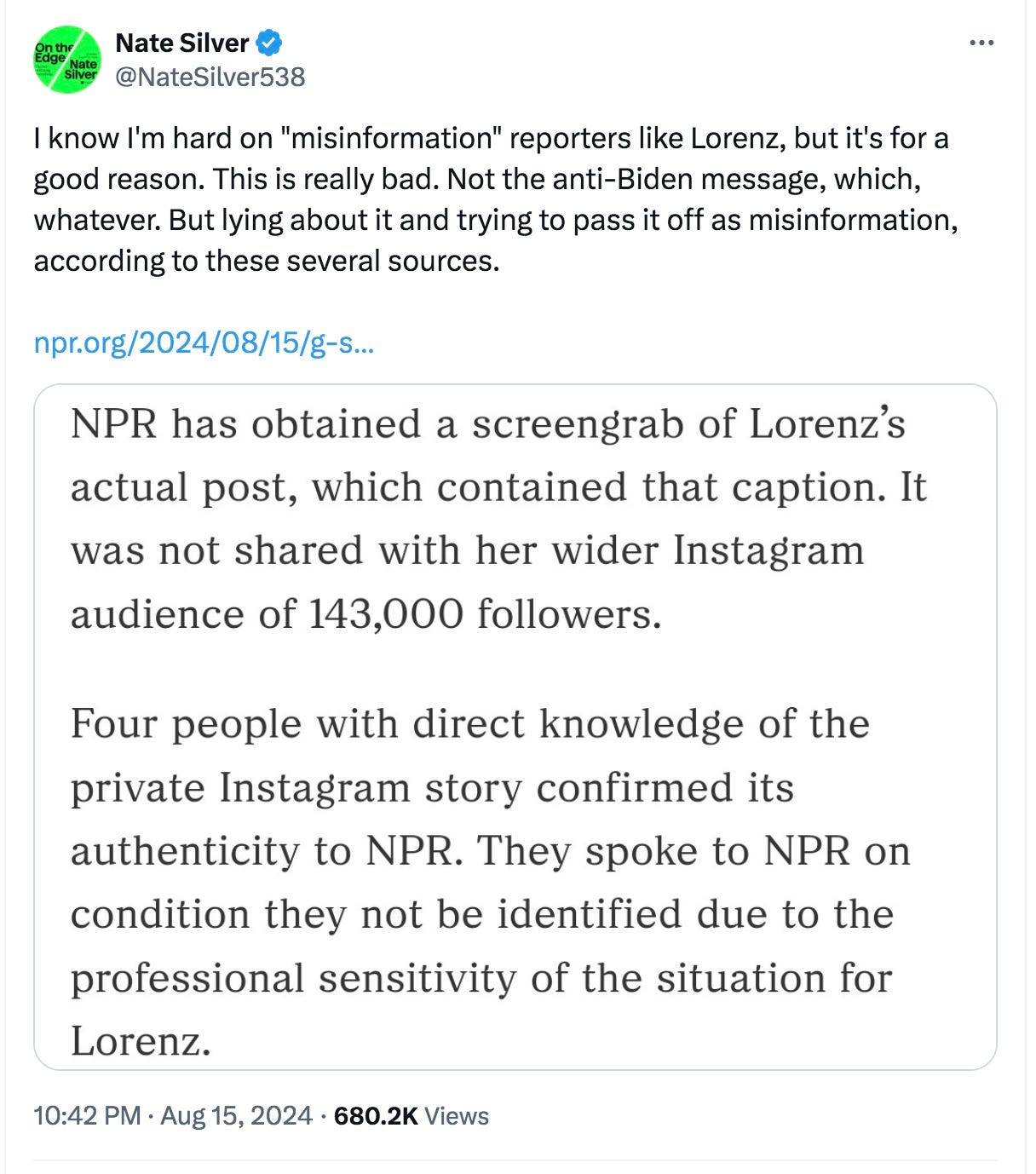E-Pluribus | August 16, 2024
The opening of the American (university) mind; Elon Musk knows free speech when he sees it; and the evolution of affirmative action.
A round-up of the latest and best musings on the rise of illiberalism in the public discourse:
Bryan Gentry: To Rebuild Trust, Universities Need To Build Open-Minded Brands
How about if universities focus first and foremost on teaching students? Doesn’t sound that radical, but too often universities are known more for public positions they take than for the education they provide. At Discourse Magazine, Bryan Gentry lays out how institutions of higher learning can return to their roots.
[H]igher education’s reputation has taken a hit because of politics. More than 40% of those who said they lack confidence cited the perception that universities are offering liberal indoctrination rather than education. Another 30% said students are not learning necessary skills.
This is why I believe that cultivating an open-minded university brand is a compelling response to this situation. Our universities must build reputations for open inquiry, viewpoint diversity, honest dialogue and, above all else, education. This is an idea in which I’ve come to believe over 13 years of working in higher education. But Gallup’s newest findings lend more credence to the need for rebuilding universities’ brands so that they emphasize open-minded education. Only then will we regain public confidence in our institutions.
[. . .]
Although we in academia have recognized for years how perceptions that campus is closed-minded have been driving the decline in trust in universities, we have done little to address this political divide. In fact, some university communications—from reactions to the election of Donald Trump to official comments on Supreme Court cases and social issues—have reinforced the image of a political campus. Also, the stories we share about alumni and students often feature people working on progressive causes, while Republicans and conservative causes rarely show up. Meanwhile, political liberals far outnumber conservatives on faculties and in administrations, as well as among invited speakers.
[. . .]
To regain public trust, universities need to craft more open-minded reputations.
First, universities must publicly reinforce and publicize ideals of open inquiry, viewpoint diversity, constructive dialogue and honest debate.
[. . .]
Second, universities must focus their marketing on education and the student experience—answering the broad concerns the public has expressed about the value of education.
[. . .]
In practice, an open-minded brand looks like an alumni magazine article about graduates who work in Republican politics—a topic that sometimes makes universities shy. It looks like high-profile events with conservative, moderate and politically undefinable individuals—perhaps events that put people who disagree with each other in conversation together. It looks like taking a public stand for free speech and not bowing to the demands of cancel culture. It looks like centering the classroom experience and the skills students gain.
Read it all.
Kathleen Stock: Musk’s two-tier vision of free speech
There are as many opinions about Elon Musk as there are people who know who the billionaire/entrepreneur/provocateur/Twitter (X) owner is. Although Musk professes to be a free speech absolutist, Kathleen Stock argues at UnHerd that Musk isn’t all that different than most of the rest of us when it comes to what speech should be free and what goes too far.
Communications offences in UK law have long included sending “grossly offensive” and “indecent” messages, as well as obscene and threatening ones. Last year’s Online Safety Act also criminalised knowingly false messages intended to cause “non-trivial psychological or physical harm to a likely audience” without “reasonable excuse”. Meanwhile, the Criminal Justice Act generally requires that racial or religious hostility be treated as aggravating factors in criminal conviction, resulting in heavier sentences than otherwise. Pleading guilty also means the decision can be faster than when guilt has to be established at a trial.
Accordingly, there have been some swift and draconian-looking judicial decisions over the past few days for Musk to highlight for his avid followers, contrasting them with apparently lenient criminal cases involving immigrants to the UK. “It’s 2030 in the UK, & you’re being executed for posting a meme…” goes one typically restrained post. Retweets have included memes merging the British police with the SS, and one jokily showing Starmer as a Nazi — a bit unfair when you remember it was the Conservatives who brought in the Online Safety Act in the first place.
[. . .]
It’s not that the vision of the UK being projected around the world at the moment has no truth behind it. As Carl Jung said of projections generally: “It frequently happens that the object offers a hook to the projection, and even lures it out.” The UK unambiguously has two-tier policing, at least in one sense: it has aggravated offences and non-aggravated ones. We also have a judicial system focused on maintaining public order and so likely to engage in example-setting, and politicians across the board who agree that visibly harsh sentences have a generally deterrent effect.
After a decade of institutionally adopted white guilt in many quarters, it is indeed possible that sometimes the judiciary punishes white offenders disproportionately relative to other ethnicities for the very same crimes — though cherry-picking individual decisions to compare them, as Musk and others are doing, is a terrible way to establish this as true. What does seem clear is that elements of the establishment are markedly more at ease castigating white working-class people than non-white ethnic groups, including where speech inciting racial and religious violence is concerned.
[. . .]
People often say they want neutrality, but it’s tempting to conclude they just want a system that doesn’t enable their political enemies to succeed — and that’s not the same thing.
And the same apparently applies to Musk too. He didn’t seem such a big fan of free speech when his employee Martin Tripp spoke to a journalist about environmentally and financially damaging waste-management practices at the Tesla plant in 2018. Back then, Musk accused Tripp of “sabotage” and personally instructed others to hack his phone and emails, while a Tesla spokesman falsely claimed that Tripp was intending to come to the factory to commit a mass shooting.
[. . .]
The unpalatable truth for those who would idolise Musk is that he’s as limited, self-interested, and hypocritical as the rest of us. The unpalatable truth for those who demonise him is that they are too. In fact, we are all “two-tier”, though it would be good if our justice system was not. Reality will always outstrip Manichean projections, whether about the world’s richest man or the state of the UK.
Read it all here.
Megan Maldonado: Grade Inflation Is the New Affirmative Action
Quotas are out (or at least on their way out), but Ivy League professor Megan Maldonado says that doesn’t mean affirmative action has gone away - it’s just evolved. “Participation trophies” were once fodder for mockery, but Maldonado via Minding the Campus alleges that that’s exactly what college grades are becoming, and it’s to the detriment of those ostensibly being helped.
I teach at an Ivy League university. I can’t count how many colleagues have told me that they “just give everyone an A.”
This mindset doesn’t belong to just one instructor, department, discipline, or generation. I do not “out” any one or two particular people when I describe my experience with grade inflation. It’s happening everywhere, and some instructors even boast of the practice.
At best, grade inflation robs students of their education. At worst, it has outsized, negative consequences for students once they graduate, most especially for those who are socioeconomically disadvantaged. Graduates with money and well-connected families can cope with the burden of a mediocre reputation. Graduates whose futures depend entirely on their merit and perceived potential? We’ve set them back with the very degree we promised would put them ahead in life.
We know what happens when the public believes some applicants are less capable than others. Affirmative action, irrespective of one’s opinion about its efficacy or necessity, never escaped the popular opinion that it “mismatched” underqualified applicants to selective colleges. Some black and Latino students have wondered whether they were admitted based on their merit or merely because of their skin color. The insecurity generated by perpetuating a system of reduced merit not only belittles the students in question but also leads to an expectation from professors—and prospective employers—that these students cannot perform up to standard. Likewise, grade inflation is a practice that would seem to advance equity or even “decolonize” the classroom, yet the ultimate effect is undermining student achievement. Recent graduates’ reputations for competence are tarnished when their academic proficiency is questioned.
[. . .]
We need realistic solutions to grade inflation, which will benefit the students most harmed by this practice. Speaking from experience, berating individual instructors will not work en masse. If presented with the option to give an A or risk their jobs, instructors with employment precarity who do the majority of teaching at American colleges and universities will likely choose the former. Departments, especially faculty with tenure, must determine by what standards student work will be evaluated. Deans and department heads must provide their teaching faculty with administrative support in case of blowback over grading, and the line must be held. Course evaluations by students should not be interpreted as reliable markers of instructors’ competencies, given the noted correlation between positive course evaluations and students’ satisfaction with their anticipated grades. Undoing the damage of grade inflation can only happen if administrators and department heads collectively hold the line on fair grading based on honest assessments of students’ work.
Read the whole thing.
Around Twitter (X)
Via Steve McGuire, Johns Hopkins University is the latest institution to move towards institutional neutrality. Excerpt below; click for the whole thread.
After Jon Levine catches the Washington Post’s Taylor Lorenz with an embarrassing Instagram message, Nate Silver calls out “disinformation” hypocrisy:
And finally, Charles Cooke has a suggestion for the Harris campaign’s Five Four Year Plan to control prices:










